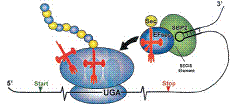Biochemistry, Department of

Vadim Gladyshev Publications
Document Type
Article
Date of this Version
June 2001
Abstract
Selenocysteine (Sec) tRNA (tRNA [Ser]Sec) serves as both the site of Sec biosynthesis and the adapter molecule for donation of this amino acid to protein. The consequences on selenoprotein biosynthesis of overexpressing either the wild type or a mutant tRNA [Ser]Sec lacking the modified base, isopentenyladenosine, in its anticodon loop were examined by introducing multiple copies of the corresponding tRNA [Ser]Sec genes into the mouse genome. Overexpression of wild-type tRNA [Ser]Sec did not affect selenoprotein synthesis. In contrast, the levels of numerous selenoproteins decreased in mice expressing isopentenyladenosine-deficient (i6A-) tRNA [Ser]Sec in a protein- and tissue-specific manner. Cytosolic glutathione peroxidase and mitochondrial thioredoxin reductase 3 were the most and least affected selenoproteins, while selenoprotein expression was most and least affected in the liver and testes, respectively. The defect in selenoprotein expression occurred at translation, since selenoprotein mRNA levels were largely unaffected. Analysis of the tRNA [Ser]Sec population showed that expression of i6A- tRNA [Ser]Sec altered the distribution of the two major isoforms, whereby the maturation of tRNA [Ser]Sec by methylation of the nucleoside in the wobble position was repressed. The data suggest that the levels of i6A- tRNA [Ser]Sec and wild-type tRNA [Ser]Sec are regulated independently and that the amount of wild-type tRNA [Ser]Sec is determined, at least in part, by a feedback mechanism governed by the level of the tRNA [Ser]Sec population. This study marks the first example of transgenic mice engineered to contain functional tRNA transgenes and suggests that i6A- tRNA [Ser]Sec transgenic mice will be useful in assessing the biological roles of selenoproteins.


Comments
Published by MOLECULAR AND CELLULAR BIOLOGY, June 2001, p. 3840–3852. Copyright © 2001, American Society for Microbiology. Permission to use.